Ward A.W. The Cambridge History of British Foreign Policy. 1783-1919. Volume 3
Подождите немного. Документ загружается.

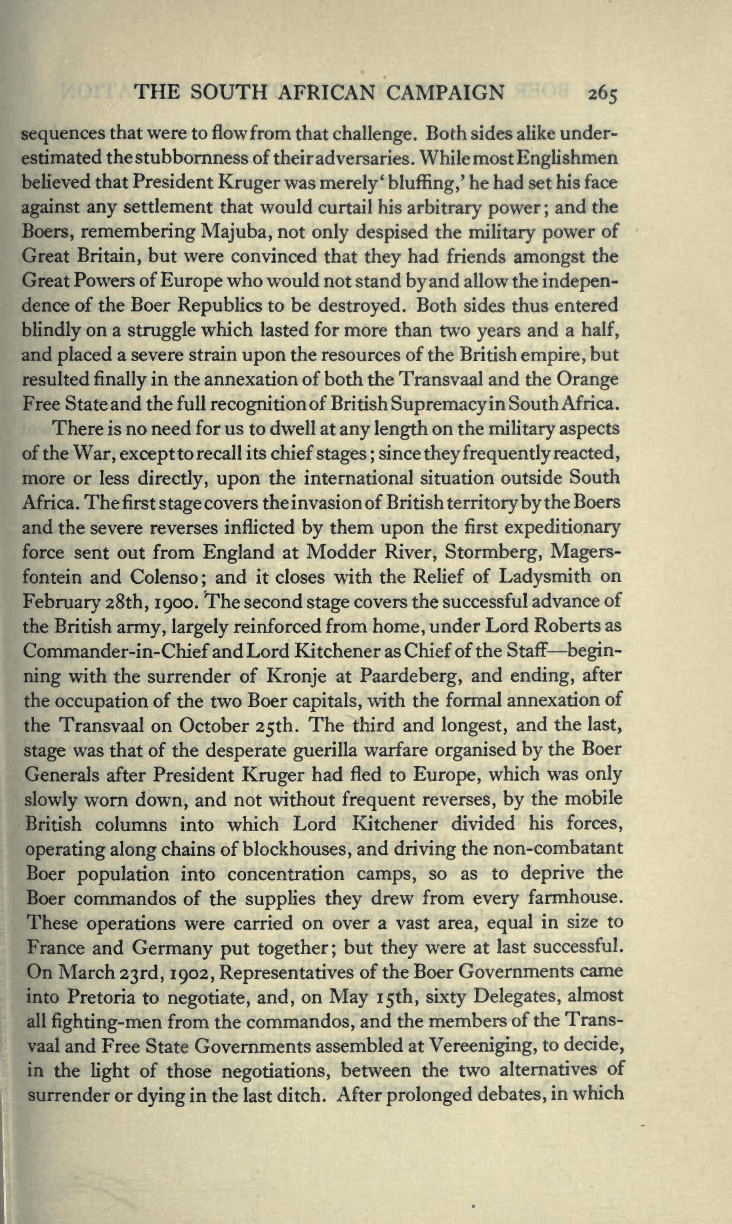
THE
SOUTH
AFRICAN CAMPAIGN
265
sequences
that were
to
flow
from
that
challenge.
Both
sides
alike under-
estimated
the
stubbornness of
theiradversaries.
While most
Englishmen
believed that
President
Kruger
was
merely' bluffing,'
he
had
set
his
face
against
any
settlement that would
curtail
his
arbitrary
power
;
and
the
Boers,
remembering
Majuba,
not
only
despised
the
military
power
of
Great
Britain,
but
were
convinced
that
they
had
friends
amongst
the
Great
Powers
of
Europe
who
would
not
stand
by
and allow
the
indepen-
dence
of
the
Boer
Republics
to
be
destroyed.
Both sides
thus
entered
blindly
on a
struggle
which
lasted
for
more
than two
years
and a
half,
and
placed
a severe
strain
upon
the
resources
of
the British
empire,
but
resulted
finally
in
the annexation
of
both
the
Transvaal and
the
Orange
Free
State
and
the
full
recognition
of
British
Supremacy
in
South
Africa.
There
is no need
for us
to dwell
at
any length
on
the
military
aspects
of
the
War,
except
to
recall
its
chief
stages
;
since
theyfrequently
reacted,
more
or
less
directly, upon
the
international situation
outside
South
Africa.
The
first
stage
covers
the
invasion of British
territory
by
the
Boers
and
the severe reverses inflicted
by
them
upon
the first
expeditionary
force
sent out
from
England
at
Modder
River,
Stormberg,
Magers-
fontein and Colenso
;
and it closes with the
Relief
of
Ladysmith
on
February
28th,
1900.
The second
stage
covers
the
successful
advance
of
the
British
army, largely
reinforced
from
home,
under
Lord
Roberts
as
Commander-in-Chief
and
Lord
Kitchener
as
Chief of
the Staff
—
begin-
ning
with
the
surrender
of
Kronje
at
Paardeberg,
and
ending,
after
the
occupation
of
the two
Boer
capitals,
with
the
formal annexation
of
the
Transvaal on
October
25th.
The third and
longest,
and
the
last,
stage
was
that
of
the
desperate guerilla
warfare
organised
by
the
Boer
Generals
after
President
Kruger
had fled
to
Europe,
which
was
only
slowly
worn
down,
and not without
frequent
reverses,
by
the
mobile
British
columns
into
which
Lord
Kitchener
divided
his
forces,
operating
along
chains
of
blockhouses,
and
driving
the
non-combatant
Boer
population
into
concentration
camps,
so as
to
deprive
the
Boer
commandos of
the
supplies they
drew
from
every
farmhouse.
These
operations
were carried
on
over a vast
area,
equal
in
size to
France and
Germany
put
together;
but
they
were at
last
successful.
On
March
23rd,
1902,
Representatives
of
the
Boer
Governments
came
into
Pretoria
to
negotiate,
and,
on
May
15th, sixty
Delegates,
almost
all
fighting-men
from
the
commandos,
and the
members
of
the
Trans-
vaal
and
Free
State
Governments
assembled
at
Vereeniging,
to
decide,
in
the
light
of
those
negotiations,
between the
two
alternatives
of
surrender or
dying
in
the last
ditch.
After
prolonged
debates,
in which
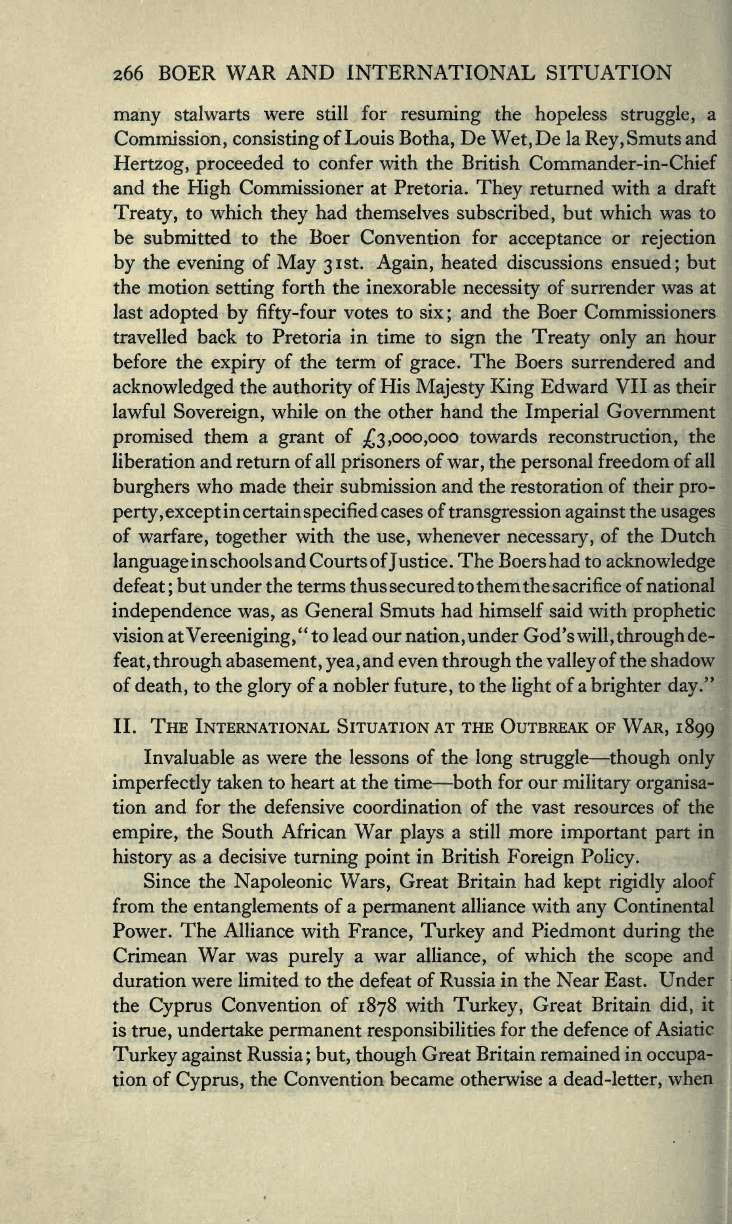
266
BOER
WAR
AND
INTERNATIONAL SITUATION
many
stalwarts
were
still
for
resuming
the
hopeless struggle,
a
Commission,
consisting
of
Louis
Botha,
De
Wet,De
la
Rey,
Smuts
and
Hertzog,
proceeded
to confer
with the
British
Commander-in-Chief
and
the
High
Commissioner
at Pretoria.
They
returned with
a
draft
Treaty,
to
which
they
had
themselves
subscribed,
but
which
was
to
be
submitted to the
Boer
Convention
for
acceptance
or
rejection
by
the
evening
of
May 31st. Again,
heated discussions
ensued;
but
the
motion
setting
forth
the inexorable
necessity
of
surrender
was
at
last
adopted
by fifty-four
votes to
six
;
and
the
Boer Commissioners
travelled
back
to Pretoria
in
time
to
sign
the
Treaty only
an
hour
before
the
expiry
of
the term
of
grace.
The Boers surrendered
and
acknowledged
the
authority
of
His
Majesty King
Edward VII as
their
lawful
Sovereign,
while
on
the other
hand
the
Imperial
Government
promised
them
a
grant
of
£3,000,000
towards
reconstruction,
the
liberation
and return
of
all
prisoners
of
war,
the
personal
freedom
of all
burghers
who made
their
submission
and
the restoration
of
their
pro-
perty,
except
in
certain
specified
cases of
transgression against
the
usages
of
warfare,
together
with
the
use,
whenever
necessary,
of
the Dutch
language
in
schools
and
Courts
of
Justice.
The
Boers
had
to
acknowledge
defeat
;
but
under
the terms thus
secured
to themthe
sacrifice
of
national
independence
was,
as General Smuts
had
himself
said
with
prophetic
vision
at
Vereeniging,"
to lead
our
nation,
under God's
will,
through
de-
feat,
through
abasement,
yea,
and
even
through
the
valley
of
the shadow
of
death,
to the
glory
of a
nobler
future,
to the
light
of a
brighter
day."
II.
The International Situation
at
the
Outbreak
of
War,
1899
Invaluable as were
the lessons
of
the
long struggle
—
though only
imperfectly
taken to heart at the time
—
both
for our
military organisa-
tion and
for
the defensive
coordination
of
the vast resources
of
the
empire,
the
South African War
plays
a
still more
important part
in
history
as
a
decisive
turning
point
in
British
Foreign Policy.
Since the
Napoleonic
Wars,
Great Britain
had
kept rigidly
aloof
from
the
entanglements
of a
permanent
alliance
with
any
Continental
Power. The Alliance
with
France,
Turkey
and
Piedmont
during
the
Crimean
War was
purely
a war
alliance,
of
which
the
scope
and
duration
were
limited to the defeat
of Russia
in
the
Near
East.
Under
the
Cyprus
Convention
of
1878
with
Turkey,
Great
Britain
did,
it
is
true,
undertake
permanent
responsibilities
for
the defence
of
Asiatic
Turkey
against
Russia
;
but,
though
Great
Britain remained
in
occupa-
tion
of
Cyprus,
the Convention
became otherwise
a
dead-letter,
when
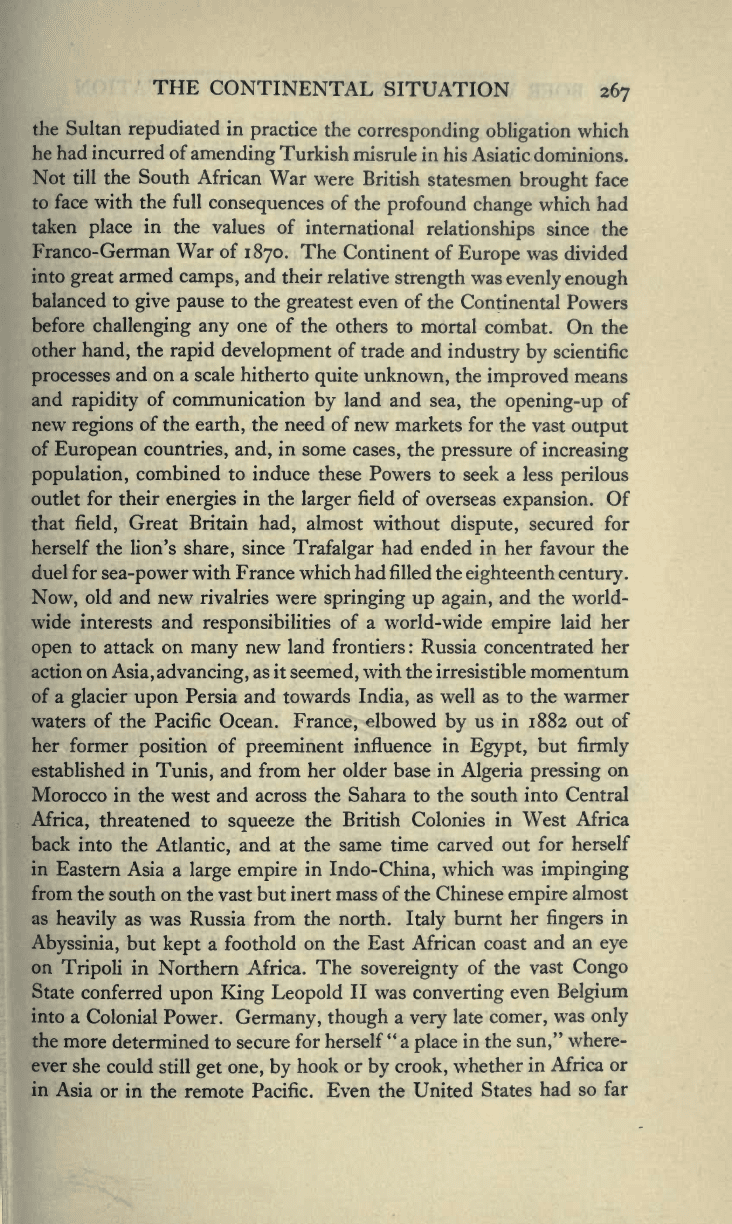
THE
CONTINENTAL
SITUATION
267
the
Sultan
repudiated
in
practice
the
corresponding
obligation
which
he
had incurred of
amending
Turkish
misrule
in
his
Asiatic
dominions.
Not
till the South
African
War
were
British
statesmen
brought
face
to
face with the full
consequences
of
the
profound
change
which had
taken
place
in
the
values of
international
relationships
since
the
Franco-German
War of
1870.
The
Continent
of
Europe
was
divided
into
great
armed
camps,
and
their
relative
strength
was
evenly enough
balanced to
give
pause
to
the
greatest
even of
the
Continental
Powers
before
challenging any
one of
the
others
to
mortal
combat.
On
the
other
hand,
the
rapid
development
of
trade and
industry by
scientific
processes
and
on
a scale
hitherto
quite
unknown,
the
improved
means
and
rapidity
of
communication
by
land and
sea,
the
opening-up
of
new
regions
of
the
earth,
the need
of
new
markets
for
the
vast
output
of
European
countries,
and,
in
some
cases,
the
pressure
of
increasing
population,
combined
to
induce
these
Powers to seek a less
perilous
outlet
for
their
energies
in
the
larger
field
of
overseas
expansion.
Of
that
field,
Great Britain
had,
almost
without
dispute,
secured
for
herself
the
lion's
share,
since
Trafalgar
had
ended
in
her favour
the
duel for
sea-power
with
France which
had
filled
the
eighteenth
century.
Now,
old and
new rivalries were
springing
up
again,
and
the
world-
wide
interests
and
responsibilities
of
a world-wide
empire
laid her
open
to attack
on
many
new land
frontiers
:
Russia
concentrated
her
action
on
Asia,
advancing,
as
it
seemed,
with the irresistible
momentum
of
a
glacier
upon
Persia and
towards
India,
as
well as
to the
warmer
waters
of
the
Pacific
Ocean.
France,
elbowed
by
us in
1882 out
of
her
former
position
of
preeminent
influence
in
Egypt,
but
firmly
established
in
Tunis,
and
from her older base
in
Algeria
pressing
on
Morocco in
the
west
and
across
the
Sahara
to
the
south into
Central
Africa,
threatened to
squeeze
the
British
Colonies
in
West
Africa
back
into the
Atlantic,
and at the
same
time
carved out
for herself
in
Eastern Asia
a
large
empire
in Indo-
China,
which
was
impinging
from
the
south
on
the vast but
inert
mass
of
the
Chinese
empire
almost
as
heavily
as
was Russia
from
the
north.
Italy
burnt
her
fingers
in
Abyssinia,
but
kept
a foothold
on
the
East
African coast
and
an
eye
on
Tripoli
in
Northern
Africa.
The
sovereignty
of
the
vast
Congo
State
conferred
upon King
Leopold
II
was
converting
even
Belgium
into a
Colonial
Power.
Germany,
though
a
very
late
comer,
was
only
the
more
determined
to
secure
for herself
"
a
place
in
the
sun,"
where-
ever
she
could
still
get
one,
by
hook
or
by
crook,
whether
in
Africa
or
in
Asia or
in
the remote
Pacific.
Even the United
States
had so
far
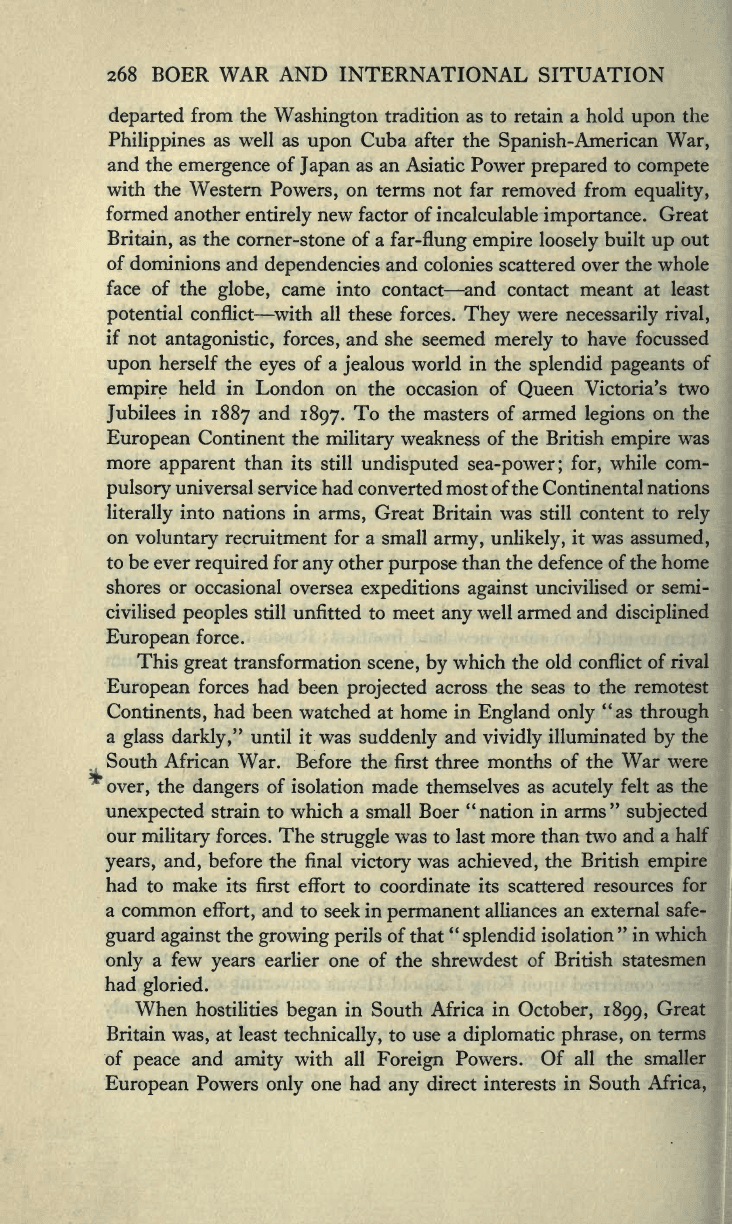
268
BOER
WAR AND
INTERNATIONAL SITUATION
departed
from
the
Washington
tradition
as
to retain
a
hold
upon
the
Philippines
as
well as
upon
Cuba
after the
Spanish-American
War,
and
the
emergence
of
Japan
as an
Asiatic Power
prepared
to
compete
with the Western
Powers,
on
terms
not
far
removed
from
equality,
formed
another
entirely
new
factor
of
incalculable
importance.
Great
Britain,
as
the
corner-stone
of
a
far-flung empire
loosely
built
up
out
of
dominions
and
dependencies
and
colonies
scattered over
the
whole
face of
the
globe,
came into
contact
—
and
contact
meant at
least
potential
conflict
—
with all these forces.
They
were
necessarily
rival,
if
not
antagonistic,
forces,
and
she seemed
merely
to
have
focussed
upon
herself
the
eyes
of a
jealous
world
in
the
splendid
pageants
of
empire
held in
London on
the
occasion of
Queen
Victoria's
two
Jubilees
in
1887
and
1897.
To
the masters
of armed
legions
on
the
European
Continent the
military
weakness
of
the
British
empire
was
more
apparent
than
its
still
undisputed
sea-power;
for,
while
com-
pulsory
universal service had
converted
most of
the
Continental
nations
literally
into
nations
in
arms,
Great Britain
was still content
to
rely
on
voluntary
recruitment
for
a
small
army, unlikely,
it
was
assumed,
to
be
ever
required
for
any
other
purpose
than
the
defence
of
the
home
shores
or
occasional
oversea
expeditions
against
uncivilised
or semi-
civilised
peoples
still
unfitted to meet
any
well
armed and
disciplined
European
force.
This
great
transformation
scene,
by
which
the
old conflict
of rival
European
forces
had been
projected
across
the
seas to the
remotest
Continents,
had
been
watched at
home
in
England
only
"as
through
a
glass
darkly,"
until
it
was
suddenly
and
vividly
illuminated
by
the
South
African
War. Before
the first three
months
of
the
War
were
over,
the
dangers
of
isolation made
themselves
as
acutely
felt
as
the
unexpected
strain to
which
a small Boer "nation
in
arms"
subjected
our
military
forces.
The
struggle
was
to last
more
than two
and
a
half
years,
and,
before
the
final
victory
was
achieved,
the British
empire
had
to make
its
first
effort to coordinate
its
scattered
resources
for
a common
effort,
and
to seek
in
permanent
alliances
an
external
safe-
guard against
the
growing perils
of
that
"
splendid
isolation
"
in
which
only
a few
years
earlier one of
the
shrewdest
of
British
statesmen
had
gloried.
When hostilities
began
in
South
Africa
in
October,
1899,
Great
Britain
was,
at least
technically,
to
use
a
diplomatic phrase,
on
terms
of
peace
and
amity
with
all
Foreign
Powers.
Of all
the
smaller
European
Powers
only
one
had
any
direct interests
in
South
Africa,
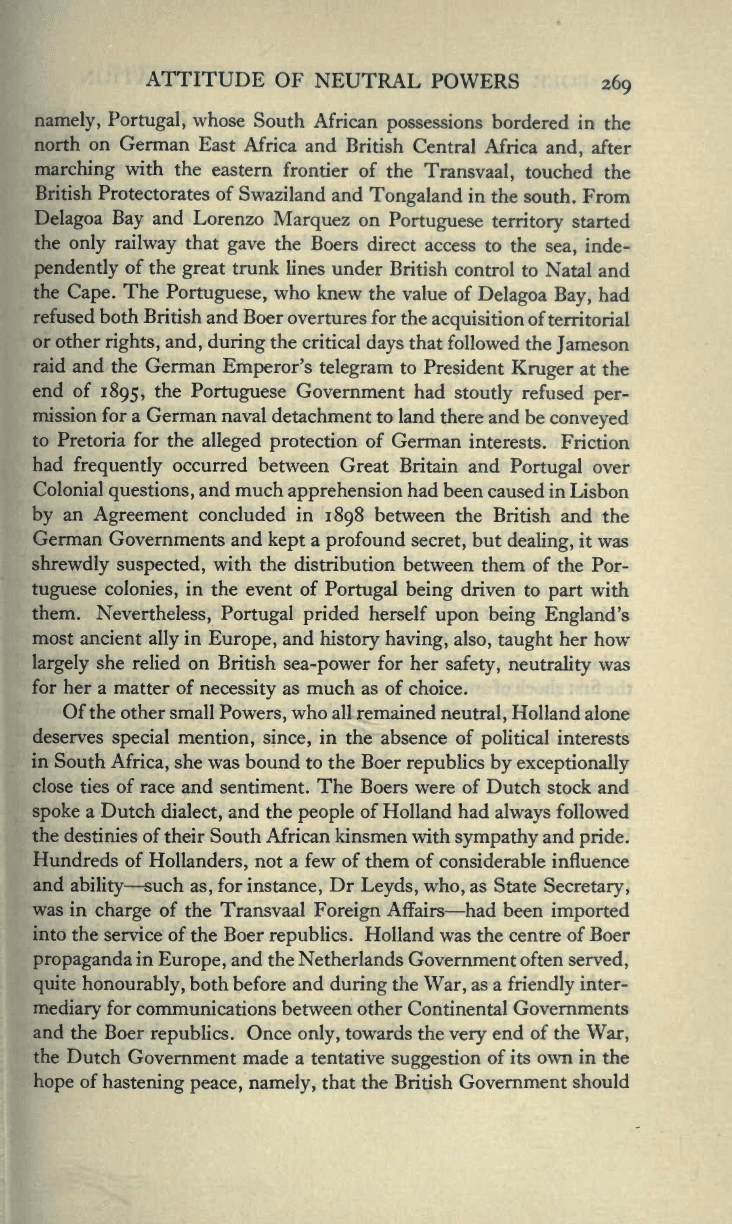
ATTITUDE
OF
NEUTRAL
POWERS
269
namely, Portugal,
whose
South African
possessions
bordered
in
the
north
on
German
East
Africa and
British
Central
Africa
and,
after
marching
with
the
eastern
frontier
of
the
Transvaal,
touched
the
British
Protectorates
of
Swaziland and
Tongaland
in
the
south.
From
Delagoa Bay
and
Lorenzo
Marquez
on
Portuguese
territory
started
the
only
railway
that
gave
the
Boers
direct access
to
the
sea,
inde-
pendently
of
the
great
trunk
lines
under
British
control
to
Natal and
the
Cape.
The
Portuguese,
who
knew
the
value of
Delagoa
Bay,
had
refused
both British and
Boer
overtures for
the
acquisition
of
territorial
or
other
rights,
and,
during
the
critical
days
that
followed
the
Jameson
raid and
the
German
Emperor's
telegram
to
President
Kruger
at the
end of
1895,
the
Portuguese
Government
had
stoutly
refused
per-
mission for a
German naval
detachment
to land
there and
be
conveyed
to
Pretoria
for
the
alleged
protection
of German
interests.
Friction
had
frequently
occurred
between
Great Britain
and
Portugal
over
Colonial
questions,
and much
apprehension
had
been
caused in
Lisbon
by
an
Agreement
concluded in
1898
between
the British and
the
German
Governments
and
kept
a
profound
secret,
but
dealing,
it was
shrewdly suspected,
with
the distribution
between
them
of
the Por-
tuguese
colonies,
in
the event
of
Portugal
being
driven
to
part
with
them.
Nevertheless,
Portugal
prided
herself
upon
being
England's
most
ancient
ally
in
Europe,
and
history having,
also,
taught
her
how
largely
she
relied on
British
sea-power
for
her
safety,
neutrality
was
for
her
a
matter
of
necessity
as much
as
of
choice.
Of
the
other
small
Powers,
who
all
remained
neutral,
Holland
alone
deserves
special
mention,
since,
in
the absence of
political
interests
in
South
Africa,
she was
bound
to the
Boer
republics
by exceptionally
close
ties
of
race and
sentiment.
The Boers
were
of
Dutch stock
and
spoke
a
Dutch
dialect,
and
the
people
of
Holland had
always
followed
the
destinies of
their South
African kinsmen
with
sympathy
and
pride.
Hundreds of
Hollanders,
not
a few
of
them
of
considerable influence
and
ability
—
such
as,
for
instance,
Dr
Leyds,
who,
as
State
Secretary,
was
in
charge
of
the Transvaal
Foreign
Affairs
—
had
been
imported
into
the
service
of
the
Boer
republics.
Holland
was
the centre
of Boer
propaganda
in
Europe,
and
the
Netherlands
Government often
served,
quite
honourably,
both
before
and
during
the
War,
as a
friendly
inter-
mediary
for
communications between
other
Continental
Governments
and
the
Boer
republics.
Once
only,
towards
the
very
end
of
the
War,
the
Dutch
Government
made a
tentative
suggestion
of
its
own
in
the
hope
of
hastening peace,
namely,
that the
British
Government
should
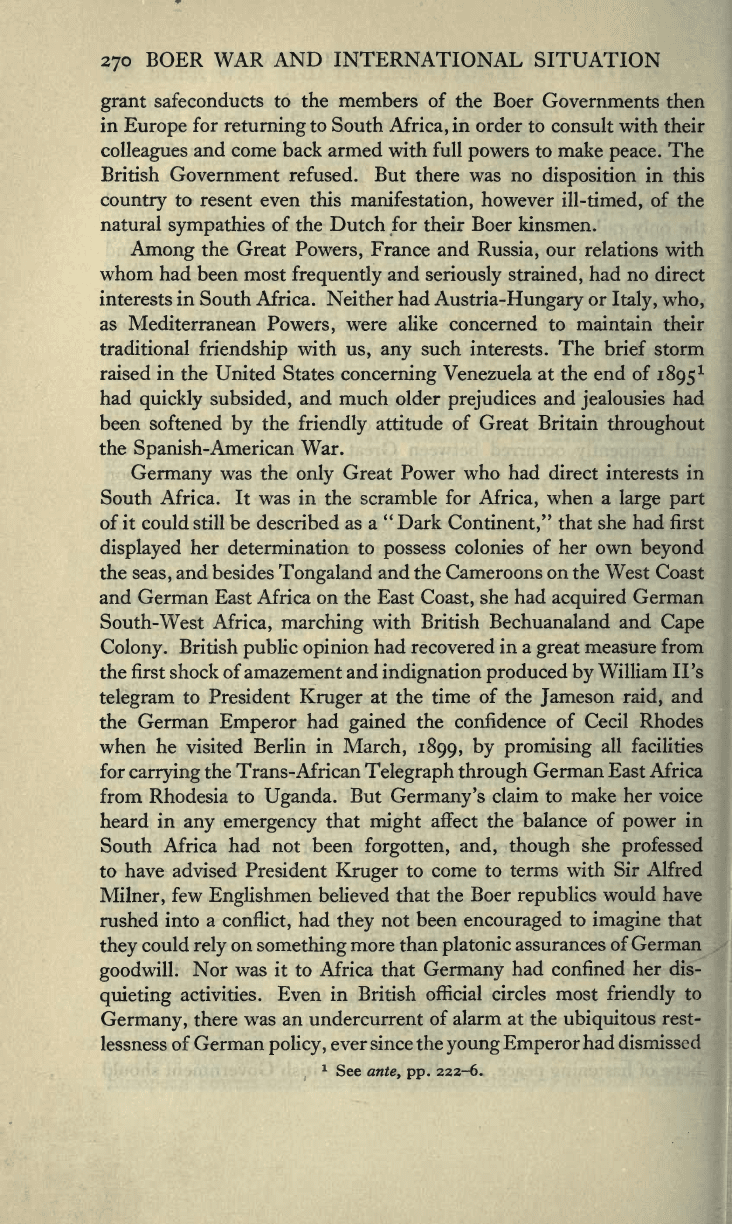
270
BOER WAR
AND
INTERNATIONAL
SITUATION
grant
safeconducts
to the members
of
the Boer
Governments then
in
Europe
for
returning
to South
Africa,
in
order
to consult with their
colleagues
and
come back
armed with
full
powers
to
make
peace.
The
British Government
refused.
But there
was no
disposition
in
this
country
to resent
even
this
manifestation,
however
ill-timed,
of
the
natural
sympathies
of
the Dutch
for
their
Boer
kinsmen.
Among
the Great
Powers,
France and
Russia,
our
relations with
whom had
been
most
frequently
and
seriously
strained,
had no
direct
interests
in
South
Africa.
Neither
had
Austria-Hungary
or
Italy,
who,
as
Mediterranean
Powers,
were
alike concerned to maintain their
traditional
friendship
with
us,
any
such
interests.
The
brief storm
raised
in
the
United States
concerning
Venezuela
at the
end of
1895
1
had
quickly
subsided,
and
much older
prejudices
and
jealousies
had
been
softened
by
the
friendly
attitude
of Great
Britain
throughout
the
Spanish-American
War.
Germany
was
the
only
Great Power who
had
direct
interests
in
South
Africa.
It was
in
the
scramble for
Africa,
when
a
large
part
of
it could still be described
asa" Dark
Continent,"
that
she
had
first
displayed
her
determination to
possess
colonies
of
her own
beyond
the
seas,
and besides
Tongaland
and
the
Cameroons
on
the West
Coast
and
German East Africa
on
the East
Coast,
she
had
acquired
German
South-
West
Africa,
marching
with
British
Bechuanaland and
Cape
Colony.
British
public
opinion
had recovered
in a
great
measure
from
the first
shock of
amazement
and
indignation
produced by
William IFs
telegram
to
President
Kruger
at
the
time
of
the
Jameson
raid,
and
the German
Emperor
had
gained
the
confidence
of Cecil Rhodes
when he visited Berlin
in
March,
1899, by
promising
all
facilities
for
carrying
the
Trans-African
Telegraph through
German East
Africa
from Rhodesia
to
Uganda.
But
Germany's
claim to make her voice
heard in
any
emergency
that
might
affect
the
balance
of
power
in
South Africa had not been
forgotten,
and,
though
she
professed
to
have advised
President
Kruger
to
come to
terms with
Sir
Alfred
Milner,
few
Englishmen
believed that the
Boer
republics
would have
rushed into
a
conflict,
had
they
not
been
encouraged
to
imagine
that
they
could
rely
on
something
more than
platonic
assurances
of German
goodwill.
Nor was it
to
Africa that
Germany
had
confined her
dis-
quieting
activities.
Even
in
British
official circles most
friendly
to
Germany,
there
was an undercurrent
of
alarm
at the
ubiquitous
rest-
lessness
of
German
policy,
ever
since the
young
Emperor
had dismissed
1
See
ante,
pp.
222-6.
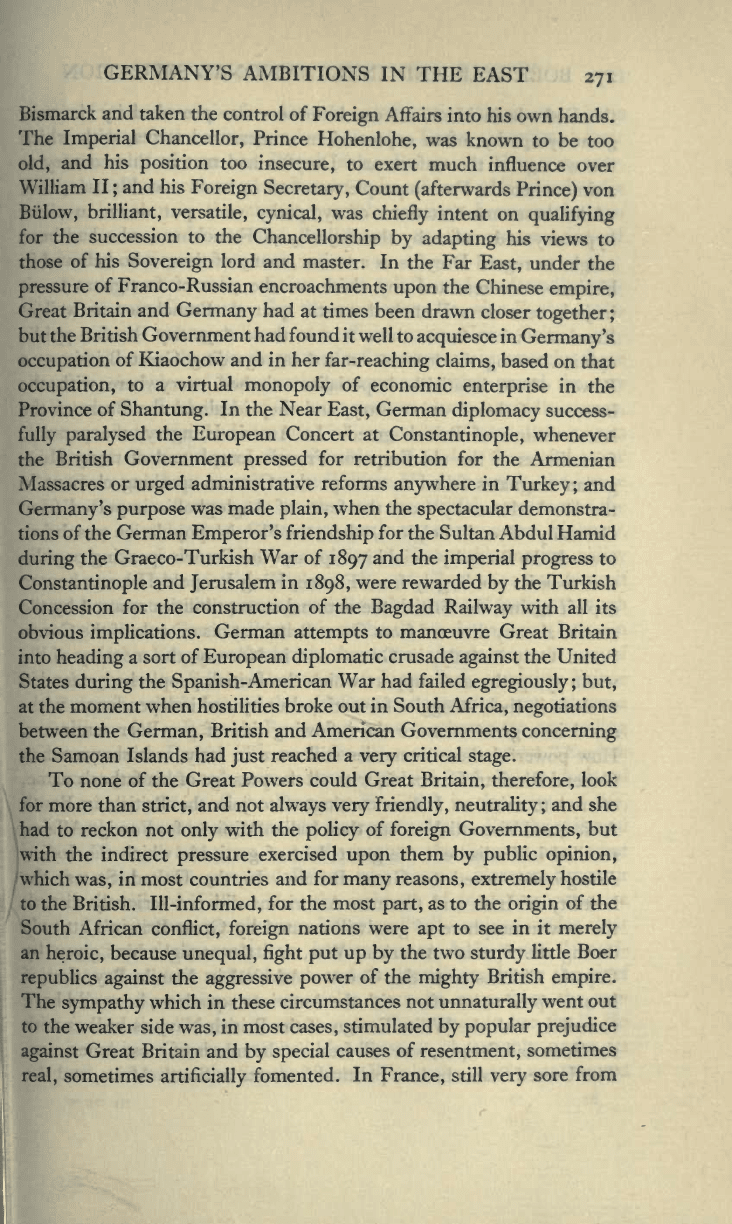
GERMANY'S
AMBITIONS IN
THE
EAST
271
Bismarck
and
taken
the
control
of
Foreign
Affairs
into his own
hands.
The
Imperial
Chancellor,
Prince
Hohenlohe,
was known
to
be
too
old,
and
his
position
too
insecure,
to
exert
much
influence over
William
II
;
and
his
Foreign
Secretary,
Count
(afterwards
Prince)
von
Biilow,
brilliant,
versatile,
cynical,
was
chiefly
intent
on
qualifying
for the
succession to
the
Chancellorship
by
adapting
his
views
to
those
of his
Sovereign
lord
and
master. In
the Far
East,
under
the
pressure
of
Franco-Russian
encroachments
upon
the
Chinese
empire,
Great
Britain
and
Germany
had
at times been
drawn
closer
together
;
but
the British
Government
had
found
it well to
acquiesce
in
Germany's
occupation
of Kiaochow and in
her
far-reaching
claims,
based on
that
occupation,
to
a
virtual
monopoly
of
economic
enterprise
in
the
Province
of
Shantung.
In
the Near
East,
German
diplomacy
success-
fully paralysed
the
European
Concert at
Constantinople,
whenever
the
British
Government
pressed
for
retribution
for
the
Armenian
Massacres
or
urged
administrative
reforms
anywhere
in
Turkey;
and
Germany's
purpose
was
made
plain,
when
the
spectacular
demonstra-
tions
of
the
German
Emperor's
friendship
for
the
Sultan
Abdul
Hamid
during
the
Graeco-Turkish
War of
1897
and
the
imperial
progress
to
Constantinople
and
Jerusalem
in
1898,
were rewarded
by
the Turkish
Concession
for
the
construction
of
the
Bagdad Railway
with
all
its
obvious
implications.
German
attempts
to
manoeuvre
Great Britain
into
heading
a sort of
European diplomatic
crusade
against
the
United
States
during
the
Spanish-
American
War had
failed
egregiously
; but,
at the moment
when hostilities
broke out
in
South
Africa,
negotiations
between the
German,
British
and
American Governments
concerning
the Samoan
Islands had
just
reached a
very
critical
stage.
To
none
of
the Great
Powers could Great
Britain,
therefore,
look
for
more than
strict,
and
not
always very friendly, neutrality
;
and she
had
to reckon not
only
with
the
policy
of
foreign
Governments,
but
with
the indirect
pressure
exercised
upon
them
by public
opinion,
which
was,
in
most countries
and for
many
reasons,
extremely
hostile
to
the
British.
Ill-informed,
for
the
most
part,
as
to the
origin
of
the
South African
conflict,
foreign
nations
were
apt
to
see in
it
merely
an
heroic,
because
unequal,
fight
put up by
the two
sturdy
little
Boer
republics
against
the
aggressive
power
of
the
mighty
British
empire.
The
sympathy
which in
these
circumstances not
unnaturally
went out
to
the weaker
side
was,
in most
cases,
stimulated
by
popular
prejudice
against
Great
Britain
and
by
special
causes
of
resentment,
sometimes
real,
sometimes
artificially
fomented.
In
France,
still
very
sore
from
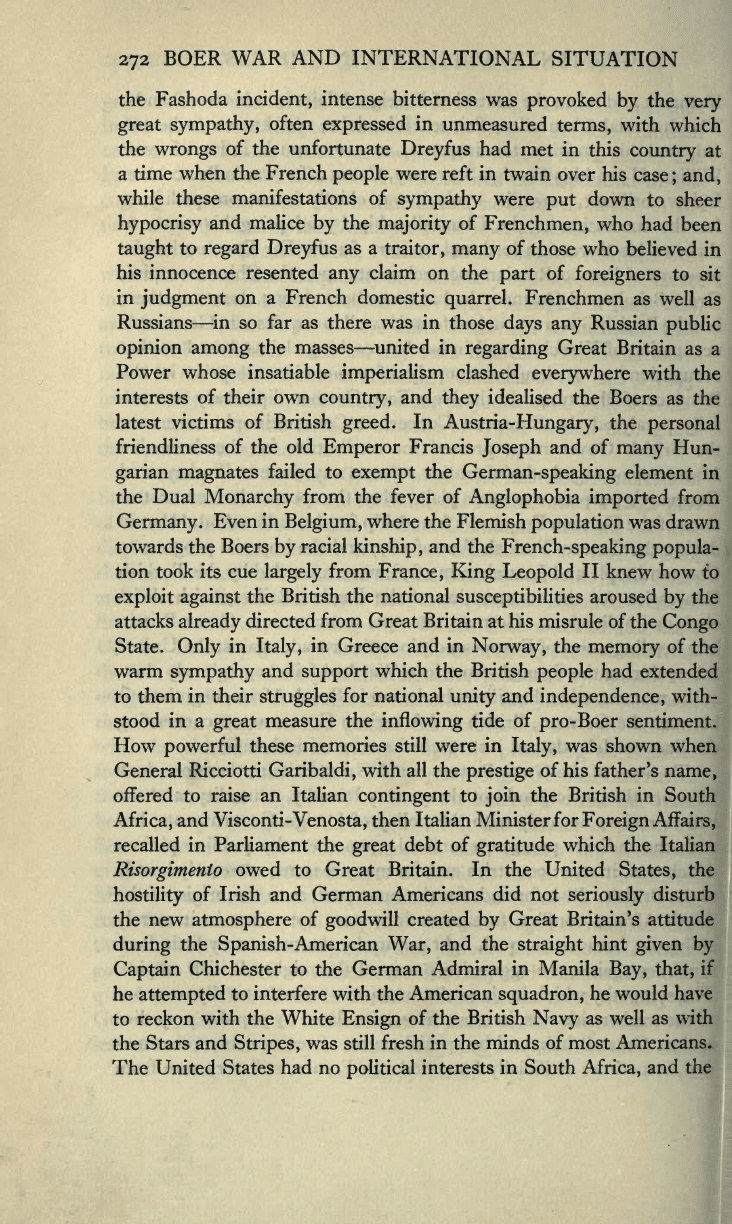
272
BOER
WAR
AND
INTERNATIONAL
SITUATION
the
Fashoda
incident,
intense
bitterness
was
provoked
by
the
very-
great
sympathy,
often
expressed
in
unmeasured
terms,
with
which
the
wrongs
of
the unfortunate
Dreyfus
had
met
in
this
country
at
a
time
when the
French
people
were
reft
in
twain
over his
case; and,
while these manifestations
of
sympathy
were
put
down
to
sheer
hypocrisy
and malice
by
the
majority
of
Frenchmen,
who had
been
taught
to
regard
Dreyfus
as a
traitor,
many
of
those who
believed
in
his innocence resented
any
claim on
the
part
of
foreigners
to
sit
in
judgment
on
a
French
domestic
quarrel.
Frenchmen as
well
as
Russians
—
in
so far as
there
was in
those
days
any
Russian
public
opinion
among
the masses
—
united in
regarding
Great Britain
as a
Power whose insatiable
imperialism
clashed
everywhere
with
the
interests
of
their
own
country,
and
they
idealised
the Boers
as
the
latest
victims
of
British
greed.
In
Austria-Hungary,
the
personal
friendliness
of
the
old
Emperor
Francis
Joseph
and of
many
Hun-
garian magnates
failed to
exempt
the
German-speaking
element
in
the
Dual
Monarchy
from
the fever
of
Anglophobia
imported
from
Germany.
Even
in
Belgium,
where
the Flemish
population
was drawn
towards
the
Boers
by
racial
kinship,
and
the
French-speaking popula-
tion took its
cue
largely
from
France,
King
Leopold
II
knew
how
to
exploit against
the
British
the
national
susceptibilities
aroused
by
the
attacks
already
directed
from
Great Britain
at
his
misrule of
the
Congo
State.
Only
in
Italy,
in
Greece
and
in
Norway,
the
memory
of
the
warm
sympathy
and
support
which the
British
people
had
extended
to
them
in
their
struggles
for
national
unity
and
independence,
with-
stood
in a
great
measure the
inflowing
tide
of
pro-Boer
sentiment.
How
powerful
these
memories
still
were
in
Italy,
was shown
when
General
Ricciotti
Garibaldi,
with
all
the
prestige
of his
father's
name,
offered to
raise
an
Italian
contingent
to
join
the
British
in
South
Africa,
and
Visconti-Venosta,
then Italian Minister
for
Foreign
Affairs,
recalled
in
Parliament
the
great
debt
of
gratitude
which
the
Italian
Risorgimenio
owed to Great
Britain.
In
the United
States,
the
hostility
of Irish and
German
Americans
did
not
seriously
disturb
the
new
atmosphere
of
goodwill
created
by
Great
Britain's
attitude
during
the
Spanish-American
War,
and the
straight
hint
given
by
Captain
Chichester to the German
Admiral
in
Manila
Bay,
that,
if
he
attempted
to
interfere with the
American
squadron,
he
would
have
to reckon
with
the
White
Ensign
of
the
British
Navy
as
well as with
the
Stars
and
Stripes,
was still
fresh in the
minds of
most
Americans.
The
United
States
had
no
political
interests
in
South
Africa,
and the
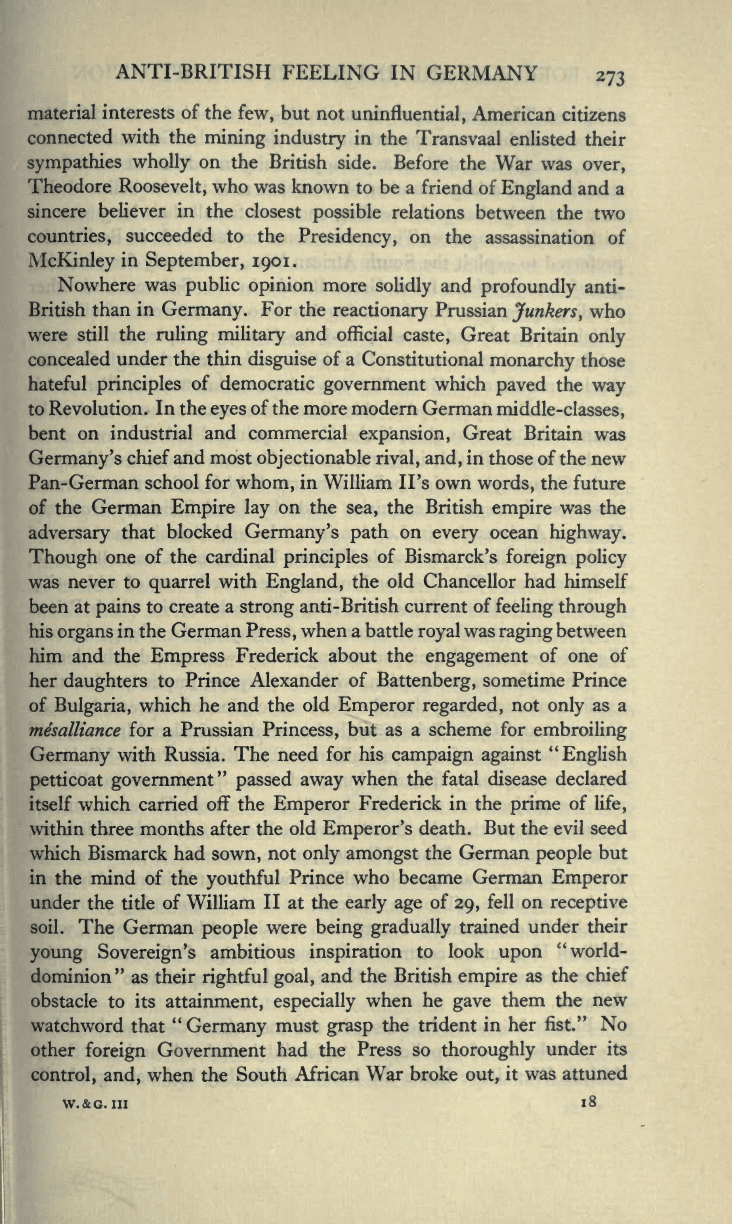
ANTI-BRITISH
FEELING
IN
GERMANY
273
material
interests
of
the
few,
but
not
uninfluential,
American
citizens
connected
with
the
mining
industry
in
the
Transvaal
enlisted
their
sympathies
wholly
on
the
British
side.
Before
the War was
over,
Theodore
Roosevelt,
who
was
known
to be a
friend of
England
and
a
sincere
believer
in
the
closest
possible
relations
between
the
two
countries,
succeeded
to
the
Presidency,
on
the
assassination of
McKinley
in
September,
1901.
Nowhere
was
public opinion
more
solidly
and
profoundly
anti-
British
than
in
Germany.
For
the
reactionary
Prussian
Junkers,
who
were still the
ruling
military
and
official
caste,
Great
Britain
only
concealed
under
the
thin
disguise
of a
Constitutional
monarchy
those
hateful
principles
of
democratic
government
which
paved
the
way
to
Revolution.
In
the
eyes
of
the
more modern
German
middle-classes,
bent on industrial
and commercial
expansion,
Great
Britain
was
Germany's
chief
and
most
objectionable
rival,
and,
in
those
of
the
new
Pan-German school
for
whom,
in William
IPs own
words,
the future
of the
German
Empire lay
on the
sea,
the British
empire
was
the
adversary
that
blocked
Germany's path
on
every
ocean
highway.
Though
one
of
the
cardinal
principles
of
Bismarck's
foreign policy
was never
to
quarrel
with
England,
the
old
Chancellor had himself
been at
pains
to create
a
strong
anti-British
current
of
feeling
through
his
organs
in
the
German
Press,
when a
battle
royal
was
raging
between
him and
the
Empress
Frederick about the
engagement
of
one
of
her
daughters
to
Prince Alexander
of
Battenberg,
sometime Prince
of
Bulgaria,
which he
and
the
old
Emperor regarded,
not
only
as
a
mesalliance for a
Prussian
Princess,
but
as a
scheme
for
embroiling
Germany
with
Russia.
The
need
for his
campaign
against "English
petticoat
government" passed
away
when the fatal
disease declared
itself which carried
off
the
Emperor
Frederick in the
prime
of
life,
within three months after the
old
Emperor's
death. But
the evil seed
which Bismarck had
sown,
not
only
amongst
the
German
people
but
in
the mind of
the
youthful
Prince who became German
Emperor
under
the title
of
William
II
at
the
early age
of
29,
fell
on
receptive
soil.
The
German
people
were
being gradually
trained
under their
young
Sovereign's
ambitious
inspiration
to
look
upon
"world-
dominion
"
as their
rightful goal,
and the British
empire
as
the
chief
obstacle
to its
attainment,
especially
when he
gave
them the
new
watchword
that
"
Germany
must
grasp
the trident
in
her
fist."
No
other
foreign
Government
had
the
Press so
thoroughly
under its
control,
and,
when
the
South
African
War
broke
out,
it
was
attuned
w.&g. in
18
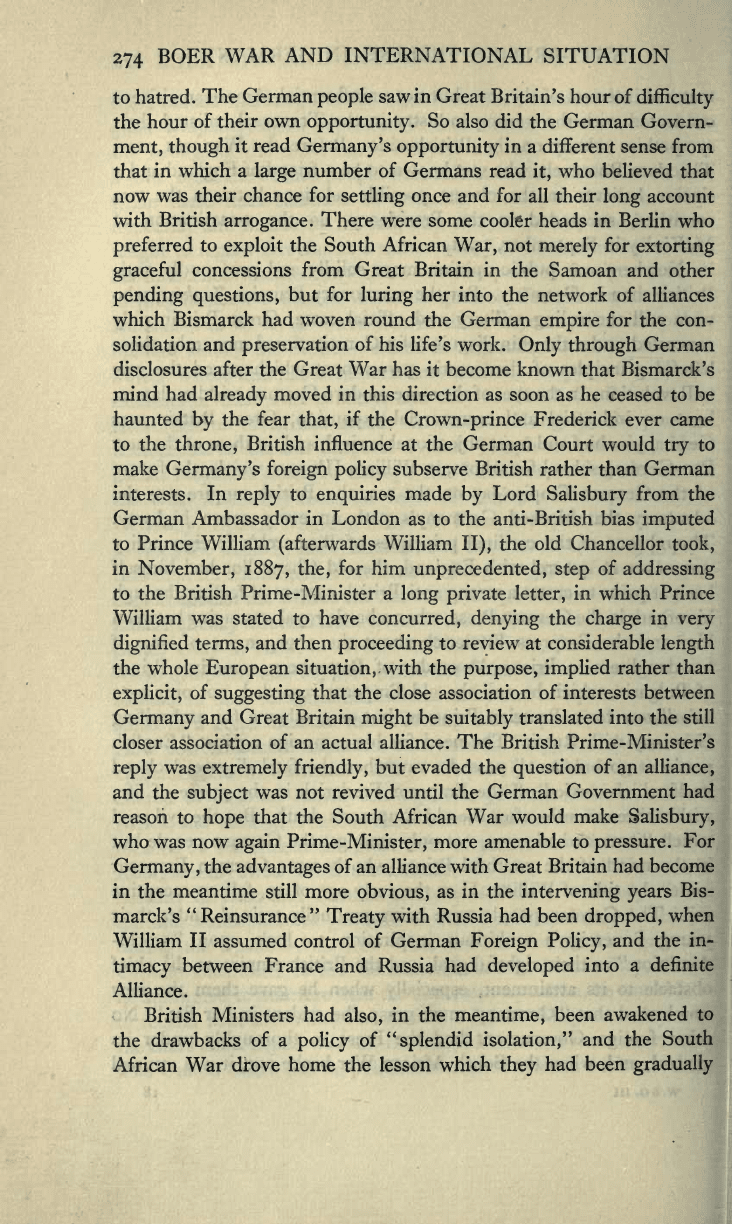
274
B
^ER
WAR
AND
INTERNATIONAL
SITUATION
to hatred.
The
German
people
saw
in
Great Britain's hour of
difficulty
the
hour
of their
own
opportunity.
So
also did
the
German
Govern-
ment,
though
it
read
Germany's
opportunity
in
a
different
sense from
that
in which a
large
number
of
Germans read
it,
who
believed
that
now
was
their
chance
for
settling
once
and
for
all
their
long
account
with British
arrogance.
There were
some cooler
heads
in
Berlin who
preferred
to
exploit
the
South African
War,
not
merely
for
extorting
graceful
concessions
from
Great Britain in
the
Samoan
and
other
pending questions,
but
for
luring
her
into the network
of
alliances
which
Bismarck
had
woven
round
the
German
empire
for
the
con-
solidation
and
preservation
of
his life's work.
Only through
German
disclosures
after the Great
War has
it
become known
that
Bismarck's
mind had
already
moved in
this direction
as soon
as he ceased
to
be
haunted
by
the
fear
that,
if
the
Crown-prince
Frederick ever came
to
the
throne,
British
influence
at the
German
Court
would
try
to
make
Germany's foreign policy
subserve
British
rather
than
German
interests.
In
reply
to
enquiries
made
by
Lord
Salisbury
from
the
German Ambassador
in London
as
to the anti-British bias
imputed
to
Prince William
(afterwards
William
II),
the
old
Chancellor
took,
in
November,
1887,
the,
for him
unprecedented, step
of
addressing
to
the
British
Prime-Minister
a
long
private
letter,
in
which
Prince
William
was
stated to
have
concurred,
denying
the
charge
in
very
dignified
terms,
and
then
proceeding
to
review
at
considerable
length
the
whole
European
situation,
with
the
purpose, implied
rather than
explicit,
of
suggesting
that the
close association
of
interests
between
Germany
and
Great
Britain
might
be
suitably
translated into
the still
closer association
of an
actual
alliance. The
British
Prime-Minister's
reply
was
extremely
friendly,
but
evaded
the
question
of an
alliance,
and
the
subject
was
not
revived
until the
German
Government
had
reason
to
hope
that the
South
African War would
make
Salisbury,
who was now
again
Prime-Minister,
more amenable
to
pressure.
For
Germany,
the
advantages
of an alliance with
Great
Britain
had become
in
the
meantime
still
more
obvious,
as
in
the
intervening years
Bis-
marck's "Reinsurance"
Treaty
with
Russia
had been
dropped,
when
William
II
assumed
control
of
German
Foreign
Policy,
and
the
in-
timacy
between
France and Russia
had
developed
into
a
definite
Alliance.
British
Ministers
had
also,
in
the
meantime,
been
awakened
to
the
drawbacks
of a
policy
of
"splendid
isolation,"
and
the
South
African War
drove home
the
lesson
which
they
had been
gradually
